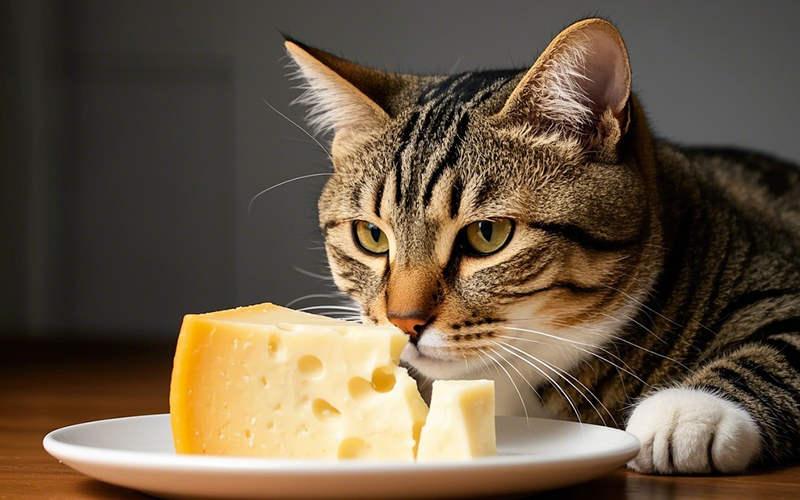Can Cats Eat Parmesan Cheese? A Guide to Cheese and Your Feline Friend
- 29 Mar 2025 11:10
Cheese is a popular snack for many people, and Parmesan is a flavorful variety that adds a rich, salty taste to dishes. But if you're a cat owner, you might be wondering, “Can cats eat Parmesan cheese?” 🧀 While some cats might enjoy the taste of cheese, it’s generally not a good idea to share Parmesan or other dairy products with your feline companion. Let’s explore why.

Why Parmesan Cheese is Not Ideal for Cats
Lactose Intolerance: Most adult cats are lactose intolerant, meaning they can't properly digest lactose, the sugar found in milk and dairy products like Parmesan cheese. When lactose-intolerant cats eat cheese, they may experience digestive upset, including diarrhea, vomiting, bloating, and stomach cramps. 🐱
High Fat Content: Parmesan cheese, like most cheeses, is high in fat. While some fat is necessary in a cat's diet, too much fat can lead to weight gain, obesity, or even more serious health problems like pancreatitis. Cheese should not be a regular part of your cat's diet due to its high fat and calorie content.
High Salt Content: Parmesan cheese is also quite salty. Excessive salt intake can lead to dehydration, kidney issues, and even salt poisoning in cats. While small amounts of salt might not cause immediate harm, it's still best to avoid high-sodium foods like cheese.
Lack of Nutritional Value for Cats: While cheese is rich in calcium and protein, these nutrients are better sourced from high-quality meat and cat food. Cats are obligate carnivores, meaning they need animal-based proteins for their nutritional needs, and cheese doesn’t offer the essential nutrients that their bodies require. 🥩
What Happens if Your Cat Eats Parmesan Cheese?
If your cat eats a small amount of Parmesan cheese, it may not cause severe issues right away, but it’s still not ideal for their health. You might notice some of the following symptoms, especially if your cat has eaten a larger amount or is lactose intolerant:
Vomiting
Diarrhea
Excessive drooling
Bloating or discomfort
Lethargy
If your cat experiences any of these symptoms after eating Parmesan, it’s a good idea to monitor them and contact a pet health professional if the symptoms persist. You can also use PettureX, the pet AI software, for quick advice and real-time consultation on whether your cat's health requires attention. 📱
Safer Alternatives for Cats
If you want to treat your cat to something special, there are plenty of safe, nutritious alternatives to cheese:
Cooked Meat: Plain, cooked chicken, turkey, or fish are excellent, protein-rich treats that will benefit your cat’s health. These are far more suited to their dietary needs than cheese.
Catnip: A natural and safe treat that many cats enjoy. It’s non-toxic and can provide some fun and mental stimulation.
Small Portions of Vegetables: Some cats like small amounts of cooked vegetables like carrots, peas, or pumpkin. These can be a source of fiber and vitamins.
High-Quality Cat Food: The best way to ensure your cat stays healthy is to stick to high-quality cat food that is specially formulated to meet their nutritional needs.
Conclusion
In conclusion, Parmesan cheese is not a good food for cats. While it may not be immediately harmful in tiny amounts, the lactose, fat, salt, and lack of nutritional value make it an unsuitable snack for your feline friend. If you’re looking for treats, opt for cat-friendly options like cooked meat or catnip instead. For more peace of mind about your cat’s health, you can always use PettureX for expert advice and consultation, ensuring you're making the best choices for your pet. 🐾
Related

The Burning Question: Can Cats Eat Jalapenos? A Comprehensive Safety Guide
- 21 Apr 2025
Cool Temptation: Can Cats Eat Ice Cream Safely? The Vet-Backed Truth
- 21 Apr 2025
Frankly Dangerous: Can Cats Eat Hot Dogs? Vet Explains the Serious Risks
- 16 Apr 2025
A Purrfect Protein? Can Cats Eat Ground Turkey Safely? (Vet-Reviewed Guide)
- 16 Apr 2025
Gritty Situation: Can Cats Eat Grits Safely? Vet Explains the Risks
- 16 Apr 2025
Gravy Danger Zone: Can Cats Eat Gravy Safely? (Vet-Reviewed Warning)
- 16 Apr 2025
Crunchy Query: Can Cats Eat Green Peppers? A Vet-Reviewed Safety Analysis
- 16 Apr 2025
Toxic Temptation: Can Cats Eat Grapefruit? Vet Explains the Dangers
- 16 Apr 2025
Emergency Meal or Major Mistake? Can Cats Eat Dog Food For A Couple Days? (Vet Guide)
- 16 Apr 2025
Dandelions & Felines: Can Cats Eat These Common Weeds Safely? Vet Explains
- 16 Apr 2025
